|
|
|
Sort Order |
|
|
|
Items / Page
|
|
|
|
|
|
|
| Srl | Item |
| 1 |
ID:
170930
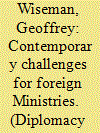

|
|
|
|
|
| Summary/Abstract |
Whilst the diplomatic studies field has grown impressively in the past decade, paradoxically there is much still to be learnt about ‘state foreign services’, a term covering the two sides of the diplomacy coin: diplomats serving at home – in the Foreign Ministry – and abroad – at embassies and consulates. Diplomats have a Janus-faced view of their profession: as envoys abroad and bureaucrats at home. This analysis first assesses the American approach to diplomacy’s two sides, focusing on the impact of the Donald Trump presidency as a benchmark. Flowing from this are several key challenges that bedevil virtually all democratic foreign ministries: How to frame the ‘national interest’? How to represent blemished or populist leaders? How to deal with dissent? How to balance the field-headquarters nexus? And how to manage relations with non-state actors. So long as the Westphalian state system survives, so, too, will the two-sided foreign-service model. Only when moving away from diplomacy as ‘state practice’ to diplomacy as ‘social practice’ can the foreign-service model recede, with diplomacy becoming disintermediated, omnilateral, and post-Westphalian, potentially manifesting radically different practices.
|
|
|
|
|
|
|
|
|
|
|
|
|
|
|
|
| 2 |
ID:
170931
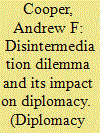

|
|
|
|
|
| Summary/Abstract |
This contribution to the Forum argues the research agenda on diplomacy has to be recalibrated: with a greater focus on how diplomacy is challenged domestically. This turbulence is intertwined with the rise of populism not from the periphery as largely featured in the past, but in the countries at the core of the international system, most noticeable in the Brexit campaign in Britain and the Donald Trump Administration in the United States. The challenge posed is that diplomacy – no less than other institutions – traditionally viewed positively as providing continuity and stability in terms of the national interest and identity has increasingly been stigmatized. Although distinctive national features cannot be ignored, a common feature in terms of generic cause and effect is an association with the concept of disintermediation highlighting a separation of diplomats not only from other components of governmental bureaucracy but citizens at large. The effect of disintermediation is more pervasive because of the use of social media and other means of going around established institutions. In addressing th is serious challenge, the research agenda must extend to comprehensive options for organisational maintenance in which the institution and operational machinery of diplomacy is re-directed towards delivery in the service of citizens.
|
|
|
|
|
|
|
|
|
|
|
|
|
|
|
|
| 3 |
ID:
170924


|
|
|
|
|
| Summary/Abstract |
The establishment of the Soviet Union was unplanned and unexpected. Originally, Vladimir Lenin formed a two-stage plan – Sovietise Ukraine and Belarus as ostensibly independent states, then merge them into Soviet Russia as autonomous units. Local Bolsheviks initially supported this plan. However, to counteract foreign, mainly Polish, support for the émigré Ukrainian and Belarusian People’s republics, Moscow decided in early 1920 to postpone the planned merger indefinitely, granting the two Soviet republics some attributes of formal independence. The fallout from the Soviet-Polish peace process of 1920–1921 then compounded the effect of these measures on local Bolsheviks. As a result, the republics started to appreciate independence. By 1922, they attempted to act independently, even in foreign policy, which Moscow could hardly tolerate. Yet, local Bolsheviks vehemently opposed Joseph Stalin’s proposal to remedy the situation by proceeding with the long-delayed merger. Fearing that a forcible union might result in an irreparable rift between Moscow and the republics, Lenin decided to change his original plan and establish the Soviet Union. It was a compromise formula, where the republics retained their ostensible independence and the Centre exercised unquestioned authority.
|
|
|
|
|
|
|
|
|
|
|
|
|
|
|
|
| 4 |
ID:
170934


|
|
|
|
|
| Summary/Abstract |
This contribution to the Forum examines the contemporary role of state foreign services in the practice of current international relations and their impact in the level of activity and influence of their countries foreign policies in the international system. In particular, studying relevant variables such as budget, legal powers, size, distribution, and professionalisation of state foreign services, it analyses the role of the ministries of foreign affairs and state foreign services in two Latin American countries, Brazil and Mexico, to evaluate if their characteristics have an impact in their global influence. It argues that the differences in the diplomatic capacities of these countries have an effect on their foreign policies’ impact in world affairs
|
|
|
|
|
|
|
|
|
|
|
|
|
|
|
|
| 5 |
ID:
170933
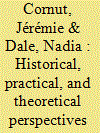

|
|
|
|
|
| Summary/Abstract |
This article analyses changes in diplomatic practices brought by twenty-first century communications technologies. There exists a close relationship between communications technologies and diplomatic practices. Since the invention of the telegraph at the end of the nineteenth century, diplomacy has been conducted at a progressively faster pace. The most recent technological developments associated with Internet have increased the speed and reach of communications, with consequences in international politics that International Relations scholars have yet to understand. Building on existing scholarship in diplomatic studies, the analysis adopts a historical perspective on the use of technology in diplomacy, examines the impact of digitalisation on diplomatic practices, and suggests new research questions that scholars need to answer. All this shows that International Relations scholars would be well-served by looking at the transformative impact of new communications technologies.
|
|
|
|
|
|
|
|
|
|
|
|
|
|
|
|
| 6 |
ID:
170922


|
|
|
|
|
| Summary/Abstract |
his analysis focusses on the diplomatic roles of Joaquim Nery Delgado (1835‒1908), a geologist who served for about 50 years in the Portuguese Geological Survey, created in 1857 as part of the cartographic programme of the Ministry of Public Works, Trade, and Industry. In recent years, increasing attention has been paid by specialists in both science and technology studies and International Relations on the relationship amongst science, technology, and diplomacy, especially after the Second World War and the ensuing Cold War. However, historically, the relationship between science and diplomacy has deeper roots, stretching back to the early modern period. In this context, Delgado’s work as a Survey geologist operating within the state bureaucracy encompassed occasional scientific, political, and economic mediating roles, notably as the Portuguese government’s official representative at international events and cartographic projects, as well as in dealings of colleagues and businessmen with the Portuguese government. His fluid diplomatic functions accompanied the re-enforcement of the state apparatus and its international relations in a difficult period of Portuguese foreign policy.
|
|
|
|
|
|
|
|
|
|
|
|
|
|
|
|
| 7 |
ID:
170928
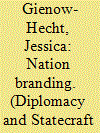

|
|
|
|
|
| Summary/Abstract |
This analysis suggests nation branding” as a useful category for the study of international relations and international history. In the past 15 years, entrepreneurs have invented nation branding as something new and modern, and governments the world over have signed up for cost-intensive campaigns to brand their countries’ images abroad. However, practices of nation branding have been around much longer. Indeed, the history of nation branding avant la lettre needs writing. That history provides a major encasement for the multitude of individual studies dedicated to soft power, public diplomacy, and cultural relations across time and space. This analysis looks first the at current experts and discourses on nation branding. Second, it sketches nation branding’s emergence from the end of the early modern period to the present. Third, it suggests a number of historical examples to inspire future research.
|
|
|
|
|
|
|
|
|
|
|
|
|
|
|
|
| 8 |
ID:
170925


|
|
|
|
|
| Summary/Abstract |
The ‘unification’ of the United States Army and Navy under the 1947 National Security Act, combined with efforts to cut expenditures after the Second World War, spawned vicious inter-service competition that undermined civilian control of the military. The nastiest feuds were between the Air Force and Navy, and then the Navy and civilian leaders of the fledgling Department of Defence. What appears as an esoteric dispute over the utility of bombers versus aircraft carriers was merely the tip of a larger struggle over the future of American military strategy. Civilian efforts to end this destructive inter-service rivalry and force the military to live within its budgetary constraints provoked open defiance during the so-called ‘Revolt of the Admirals’ in 1949. National Security Council Paper 68 offered a way out of this predicament by outlining a quasi-Keynesian fiscal policy based on rearmament that would stimulate the economy enough to offset the additional defence spending.
|
|
|
|
|
|
|
|
|
|
|
|
|
|
|
|
| 9 |
ID:
170932
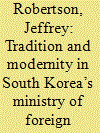

|
|
|
|
|
| Summary/Abstract |
South Korea’s diplomatic practice was traditionally marked by a distinct lack of transparency. The early struggle for political legitimacy as one-half of a divided nation and ongoing security threats placed a high premium on secrecy. Even today, diplomatic studies remains an undeveloped field. Despite the establishment of the Korea National Diplomatic Academy (KNDA) and the opening of a Centre for Diplomatic History, the amount of scholarship on the foreign ministry itself and its diplomats remains remarkably low. However, South Korea is a society undergoing momentous societal transformation. What commenced with economic development in the 1980s, and continued with political development in the 1990s evolved into societal development in the 2000s. The Ministry of Foreign Affairs (MOFA) has not been immune to these changes. MOFA is undergoing democratization and becoming more representative of broader South Korean society. It is being called on more often to serve the Korean public and to be more accountable for its actions. Finally, there is growing public recognition of the important role that the foreign ministry plays in securing South Korea’s political, economic, and security interests. This article looks at the underlying conditions which suggest the time is ripe for a practice turn in South Korean international relations, and a turn to diplomatic studies. The article highlights important research questions on the foreign ministry, which could contribute to the broader field of diplomatic studies, and justifySouth Korea as an ideal case study to highlight the benefits of studying states’ foreign services.
|
|
|
|
|
|
|
|
|
|
|
|
|
|
|
|
| 10 |
ID:
170923
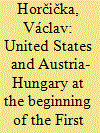

|
|
|
|
|
| Summary/Abstract |
The United States and Austria-Hungary regarded each other with growing interest during the early stages of the First World War. This analysis demonstrates that it was not a sudden change brought on by the war. Moreover, after July 1914, the Woodrow Wilson Administration had a tendency to underestimate Austria-Hungary’s ability to act independently, considering it dependent on Germany. At the same time, America hoped to drive a wedge between the Central Powers to end the struggle. Conversely, Austria-Hungary viewed American neutrality with growing disdain, especially in terms of naval warfare that decreased United States’ diplomatic manoeuvring. There were, however, several other mostly humanitarian aspects of the war and their impact on the mutual relations between the two countries in 1914.
|
|
|
|
|
|
|
|
|
|
|
|
|
|
|
|
| 11 |
ID:
170927


|
|
|
|
|
| Summary/Abstract |
In 1993, the Clinton Administration announced that containing the ‘hostile’ and ‘dangerous’ government of Iran would be a key tenet of its Middle East policy. To some scholars, the Administration’s decision reflected the influence of Israel and its supporters in Washington over American foreign policy. However, this conventional wisdom is misguided. Bill Clinton inherited and endorsed the Iran policy of his predecessor, George H.W. Bush, who concluded that Iran’s support for terrorism and pursuit of nuclear technology warranted a strong response. Bush decided on this approach when Israel was distracted and unconcerned about Iran. In fact, Israeli leaders only began drawing attention to the risks posed by Iran after America changed its policy.
|
|
|
|
|
|
|
|
|
|
|
|
|
|
|
|
| 12 |
ID:
170926


|
|
|
|
|
| Summary/Abstract |
Britain and Canada, two major nuclear Cold War actors, refrained from establishing close nuclear ties with Israel from 1958 to 1974, despite Israel’s consistent interest in importing civilian nuclear technology. This was true both before and after the nuclear Non-Proliferation Treaty came into force in 1970, even though the treaty allowed for the export of safeguarded nuclear reactors. In comparison, the other two leading nuclear exporters of the period, France and the United States, were much more involved in the initial stages of the Israeli nuclear programme, exporting research reactors to Israel in the 1950s. How did Britain and Canada view Israel’s military and civilian nuclear programme from 1958 to 1974? How did they form their nuclear export policy towards Israel and what considerations motivated them? This analysis examines these questions using archival material from British and Canadian archives.
|
|
|
|
|
|
|
|
|
|
|
|
|
|
|
|
| 13 |
ID:
170929


|
|
|
|
|
| Summary/Abstract |
It is quite understandable that diplomatic studies devote a huge amount of research to new trends in diplomacy such as public diplomacy, cyber-diplomacy, and digital diplomacy. Research has therefore become more limited when states’ foreign services and institutions are concerned. This contribution is a plea for not forgetting research perspectives on foreign ministries in the world. It insists on five good reasons to continue comparative work on what seems to be a ‘classic’ topic of diplomatic studies. The article is conceived as the introduction to a series of other contributions on the subject, all resulting from a round-table that took place at the ISA Congress 2017 in Baltimore.
|
|
|
|
|
|
|
|
|
|
|
|
|
|
|
|
|
|
|
|
|